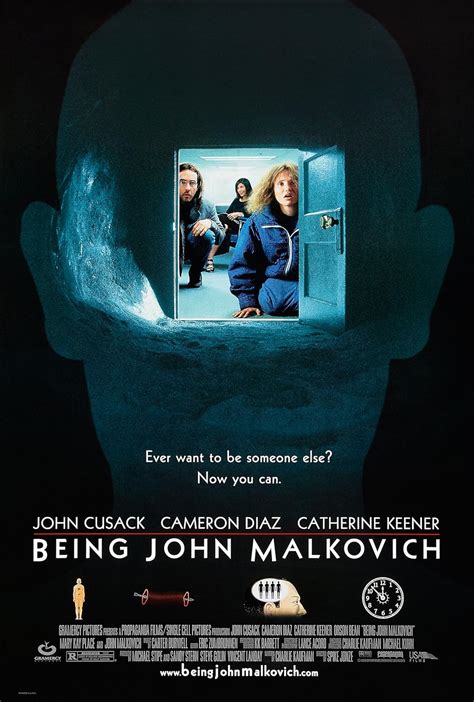Being John Malkovich
directed by: Spike Jonze, year: 1999
actors: John Cusack, Cameron Diaz, Catherine Keener, John Malkovich
actors: John Cusack, Cameron Diaz, Catherine Keener, John Malkovich

Description:
Being John Malkovich is a quirky and surreal film that follows the story of a puppeteer named Craig Schwartz, who discovers a portal that leads directly into the mind of actor John Malkovich. The film explores themes of identity, control, and the nature of consciousness as Craig and others become obsessed with the power and influence they gain by inhabiting Malkovich's body. The film is renowned for its inventive narrative, offbeat humor, and psychological depth.Keywords:
Identity, Surrealism, Consciousness, Puppetry, Existentialism, Postmodern, PeculiaritiesIs Being John Malkovich a good movie?
"Being John Malkovich" is widely regarded as a unique and thought-provoking film. Directed by Spike Jonze and written by Charlie Kaufman, it explores themes of identity, consciousness, and the nature of reality through a surreal narrative where characters can enter the mind of actor John Malkovich. Its inventive premise, strong performances (especially by Malkovich, John Cusack, and Cameron Diaz), and blend of comedy and existential inquiry have earned it critical acclaim and a cult following. Overall, it's considered a standout in indie cinema.
Is Being John Malkovich dark?
Yes, "Being John Malkovich" has dark themes that explore identity, desire, and existentialism. The film, directed by Spike Jonze and written by Charlie Kaufman, delves into the absurdity of life and the human condition through a surreal premise where characters can enter the mind of actor John Malkovich. It combines comedy with a bleak examination of personal obsession and the nature of self, leading to unsettling moments that highlight the darker aspects of human nature and relationships.
What does the ending of Being John Malkovich mean?
The ending of "Being John Malkovich" is open to interpretation, reflecting themes of identity, desire, and the search for self. In the final scenes, both Craig and Lotte enter Malkovich's mind, leading to a surreal confrontation with the concept of existence and control. The film concludes with Malkovich trapped in a puppet-like existence, suggesting the loss of autonomy and the complexities of human consciousness. Ultimately, it raises questions about the nature of identity and the boundaries between self and others, leaving viewers to ponder the implications of their own desires.
What movie took 100 Years to make?
The movie that took 100 years to make is "The 100-Year-Old Man Who Climbed Out the Window and Disappeared." Based on the novel by Jonas Jonasson, it follows a centenarian who escapes from a nursing home and embarks on an adventure, reflecting on his life. The concept of a project taking a century to develop is often more metaphorical, emphasizing the long journey of creative processes in the film industry rather than an actual production time.
Explore More Categories:
Addiction Quirky Identity Deception Resilience Charisma Alien Encounter Resourcefulness Artistic Expression Cinema Mental Health Social Media Culture Warfare Fatherhood Post War Mental Instability Urban Life Cold Deadline Dark Comedy Individuality Monarchy Piracy Supernatural Thriller Self Sufficiency